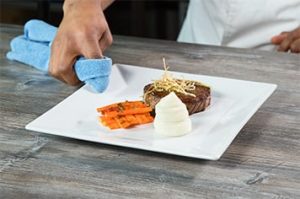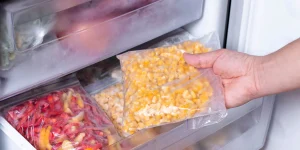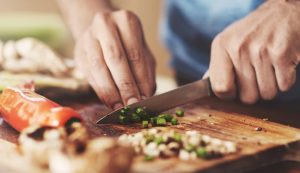Cooking is an important skill that can bring you joy and pleasure, but if not done properly, it can be time-consuming and stressful. Being efficient in the kitchen doesn’t just mean getting things done faster; it’s also designed to make cooking easier and more enjoyable. These handy tips will help you cook faster and make better use of your time in the kitchen.
1. Plan Your Meals in Advance
Planning your meals is one of the best ways to make your kitchen run more smoothly. By planning your meals, you can organize your grocery shopping, ensure you have all the ingredients you need, and reduce the time you spend deciding what to make each day. Planning your meals for the week can help you balance your diet and reduce food waste.
First, make a plan for the week with snacks, breakfast, lunch, and dinner. Follow the list you make when you go to the store based on the recipes you want to cook. This will save time and prevent you from buying things you don’t need.
2. Prep Ingredients Ahead of Time
Preparing your ingredients ahead of time can significantly reduce cooking time. Spend a few hours over the weekend washing, chopping, and dividing up the week’s food. When you’re ready to use an item, place it in an airtight container and place it in the refrigerator or freezer.
For example, you can chop vegetables, marinate meat, and cook grains ahead of time. Having ready-made meals on hand makes it easier to make a quick meal, especially during the busy summer months.
3. Organize Your Kitchen for Efficiency
A well-organized kitchen is key to quick cooking. Start by tidying up your kitchen and keeping only the items you use most often on hand. Place pots, pans, tools, and ingredients in meaningful places so you don’t have to spend too much time looking for them.
Consider grouping similar items. For example, keep all your baking ingredients in one place and keep cooking utensils close to the stove. To keep everything neat and accessible, consider using shelf risers, drawer organizers, and storage bins.
4. Use the Right Tools and Equipment
Having the right tools and equipment can help you cook faster and better. Invest in quality cooking tools that save time and effort, such as food processors, slow cookers, and chef’s knives. Using these tools can help you cook food faster and reduce the amount of time you spend cooking.
Also, make sure you have the right pots and pans for the jobs you do most. Cast iron skillets, nonstick pans, and stainless steel pans can all help you cook faster, but only if you use the right pans.
5. Learn to Multitask
To cook quickly and well, you often need to do more than one thing at a time. While it can be difficult to multitask, it can make the cooking process a breeze if you get good at it. First, make a list of tasks that can be done simultaneously without sacrificing quality or safety.
For example, you can chop vegetables or make a marinade while you wait for the water to boil. In your spare time, you can clean up on the go, do the dishes, or prepare things for your next meal. It will take some practice to do multiple things at once, but it can save you a lot of time in the long run.
6. Cook in Batches
Batch cooking saves you time and ensures that you always have home-cooked meals on hand. You can prepare many basic meals, such as soups, stews, casseroles, and rice dishes, and store them in individual portions. You can place them in the refrigerator or freezer and reheat them when needed.
Not only does batch cooking reduce the time you spend cooking each day, but it also makes meal planning easier. On busy days, having ready-made meals can also help you resist the urge to order takeout.
7. Keep Recipes Simple
It’s fun to try out complicated recipes, but cooking is easier when you keep it simple. If you’re in a hurry, choose recipes with fewer steps and ingredients. Choose meals that can be made in one pot or pan to reduce cleanup.
Even simple meals can be delicious for you. Learning simple things like boiling, sautéing, and grilling can help you make a variety of meals without spending hours in the kitchen.
Conclusion
Efficient cooking isn’t just about saving time; it’s also designed to make the kitchen a fun, efficient, and relaxing place. You can become a better, more efficient home cook by planning meals, prepping ingredients, keeping your kitchen clean and organized, using the right tools, learning how to multitask, batch cooking and making recipes easier, using leftovers, and staying focused. These tips will not only make cooking easier but more fun. You’ll be able to prepare delicious meals with less stress and work.
FAQs
1. How can I organize my kitchen for better efficiency?
Keep only the things you use most often at hand, and place pots, pans, tools, and ingredients where they make sense. To keep everything neat and accessible, use shelf risers, drawer organizers, and storage bins. Place similar items together, such as food or baking tools.
2. What are the most important cooking tools and equipment?
Invest in quality cooking tools that save time and effort, such as food processors, slow cookers, and chef’s knives. Make sure your pots and pans are suitable for the tasks you do most. For example, nonstick pans make cleaning easier and cast iron skillets allow you to prepare a variety of dishes.
3. How can I learn to multitask in the kitchen?
Look for tasks that can be done simultaneously without sacrificing quality or safety. While you’re waiting for the water to boil, you can chop vegetables or make a marinade. In your free time, you can clean up on the go or prepare your next meal.
4. What is “batch cooking”? How does it help you save time?
When you batch cook, you make a lot of basic foods at once and store them in separate portions. You can put them in the refrigerator or freezer and reheat them when needed. Batch cooking reduces the time you spend cooking each day and makes meal planning easier because you always have home-cooked meals on hand.
5. How can I make my recipes easier to follow so I can cook faster?
If you’re in a hurry, choose recipes with fewer steps and ingredients. Choose meals that only require one pot or pan so you can clean up more easily. If you use recipes that are simple, yet tasty and good for you, you can make a variety of meals without spending hours in the kitchen.




